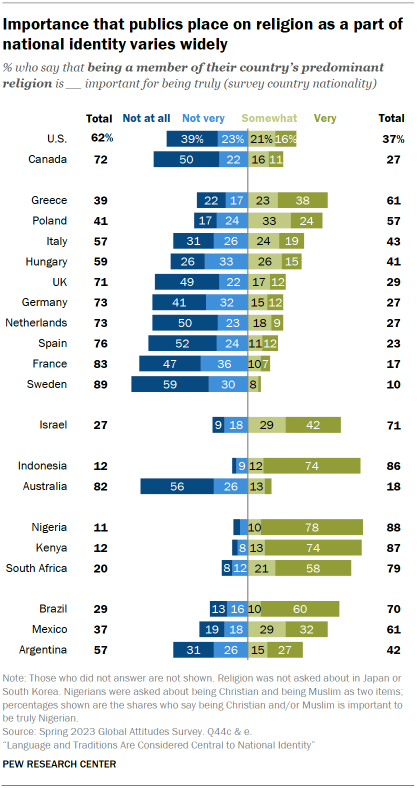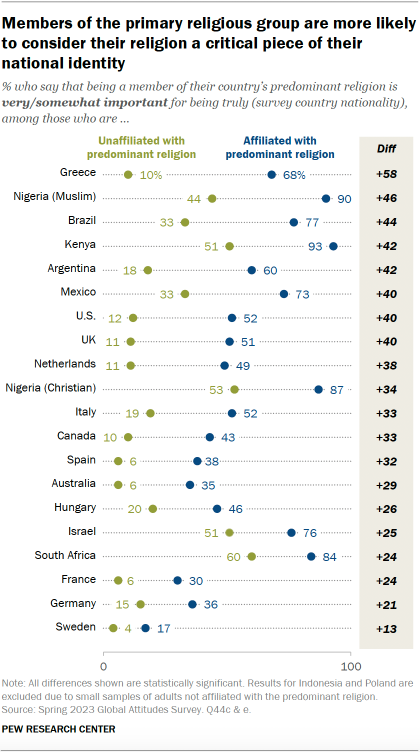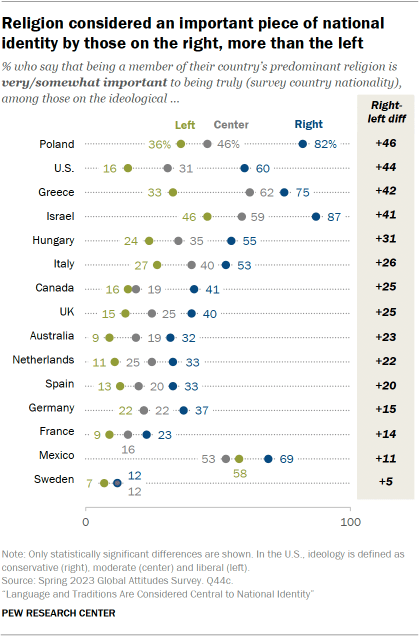Across the 21 countries where we asked this question, the role of religion in national identity varies widely by country. Majorities in 12 countries – most of which are high-income – say being part of the country’s main religious group is not an important piece of national identity. In the other nine countries where we asked this question – mostly middle-income nations – majorities say the opposite. (For more on which religion was asked about in each country, refer to Appendix C.)

Among the publics who do prioritize religion as a part of their national identity are Brazil, Indonesia, Israel, Kenya, Nigeria and South Africa, where seven-in-ten or more share this opinion. And in Indonesia, Kenya and Nigeria, about three-quarters call the primary religion very important to their national identity.
In Nigeria, where there are roughly equal shares of Muslims and Christians, all respondents were asked two separate questions – one on the importance of being Muslim and another on the importance of being Christian. About eight-in-ten say belonging to one of the country’s two most common religions is very important to being truly Nigerian.
About three-quarters or more in Australia, France, Germany, the Netherlands, Spain and Sweden say that being a member of their country’s predominant religious group is not an important factor in their national identity. This includes a 59% majority of Swedes who say that being Christian – the most common religion in Sweden – is not at all important to Swedish identity.
Views by religion
Those who belong to the main religious group in their country – whether that be Catholics in Italy or Muslims in Indonesia – are more inclined to see that religion as a key part of their national identity than those who do not identify with said religion.

In more than half the countries surveyed, just two-in-ten or fewer among those who do not identify with the religion in question see that religion as a key piece of their national identity. Take Argentina, for example, where 60% of adults who are Catholic say that being Catholic is important to being truly Argentine. Just 18% of those who are another religion or not religious at all agree.
In Nigeria, where all respondents were asked separate questions on the importance of being Christian and being Muslim, the pattern is similar: Muslim Nigerians are 46 percentage points more likely than those with other religious affiliations to say being Muslim is important to being a true Nigerian, while Christian Nigerians are 34 points more likely to say the same of Christianity.
Who is most likely to see religion as important to national identity?

Age is another demographic indicator tied to views of religion’s role in national identity. In most countries surveyed, older adults – those ages 40 and older – place greater importance on religion as a part of their national identity than their younger counterparts do. For example, 79% of Brazilians ages 40 and older say being Christian is important to their national identity, while 59% of adults under 40 agree.
Those on the ideological right are also more likely than those on the left to say that being part of their country’s main religion is important for being a true national. Take the U.S. as an example: 60% of conservatives say being Christian is important to American identity, but just 16% of liberals agree. (In the U.S., 85% of conservatives are Christian, compared with 52% of liberals.) This pattern exists in nearly every country where we can measure both ideology and the importance of religion.
And in most countries surveyed, those who make less than the median income and those with less education place greater importance on religion as a part of their national identity.




